Walking the Big Talk — Vinny Sharp, James Kumar, Alan Wan and Richie Koh In Our August ’20 Heroes Issue
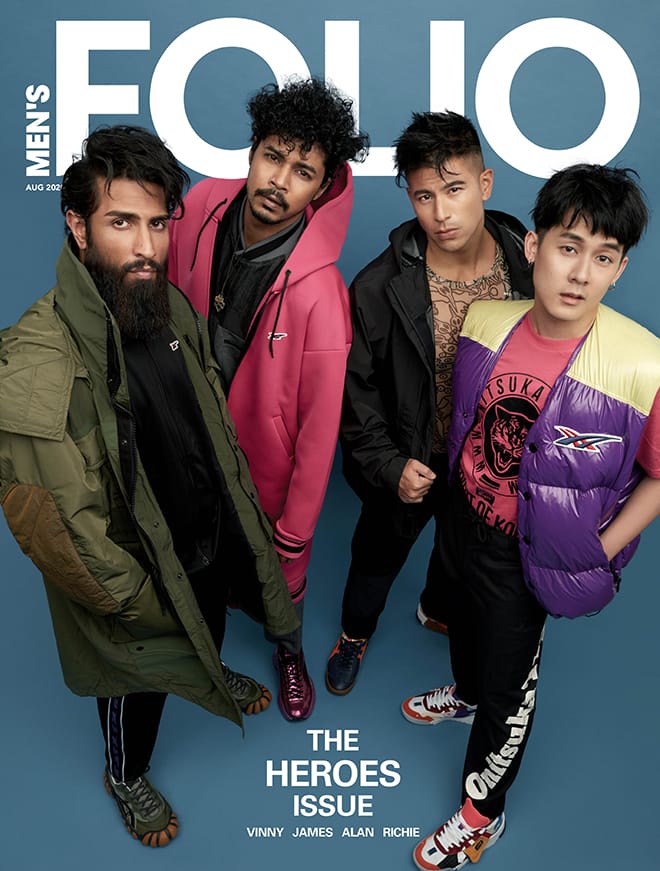
In an era where celebrities are held accountable for every action, move or speech, these four artistes — Vinny sharp, James Kumar, Alan Wan and Richie Koh — here do not just provide lip service, they are making strides and moving the conversation forward.
—

Alan Wan — The Beginning & A Fresh Start
New York, Hong Kong and Singapore, three radically different locations, separated by thousands of miles have one thing in common for Alan Wan. they were home and a career training ground of sorts to him at different points of his life.
Born and raised in Long Island, New York, the charismatic artiste never thought to be an actor until he joined the Mr Hong Kong pageant in 2008.
“I left for Hong Kong because I wanted to be in touch with my Asian roots. But when I did the pageant, I fell in love with the atmosphere, the energy, the ability to create and also the opportunity to be someone you not always are, which is special for me,” said Wan, “within the first few days, I knew this was what I wanted to do for the rest of my life.”
Everything fell into place for Wan after being placed in the top three of the pageant. Beefcake — as he is affectionately known as in Hong Kong — was a nickname given to Wan by a producer while working on his first show. It has stuck with him ever since; till today people who recognise him on the streets still remember him for it.
Wan has since left Hong Kong and relocated to Singapore in 2019. It was a period in his life when he felt the need to leave his comfort zone and to explore greener pastures abroad.
Having pretty much done all his content in either Cantonese or Mandarin, Wan felt moving to Singapore would present him opportunities to work on his English contents.
“It’s funny because I left for Hong Kong for my Asians roots but now I decided to move to Singapore to be in touch with my Western roots,” says the actor as he pointed out the Westernised style of filming in Singapore. “
The style of acting, translating feelings and emotions into Mandarin or English is totally different from each other so I felt Singapore was ideal for me to perfect the English art.”
Leaving a country you found comfort and familiarity in its establishments is never easy. The challenges range from adapting to new taboos and cultures, adjusting to the pace of life or tweaking your palettes to local cuisine — none of which has stopped Wan.
“Whenever you leave for a new country, it’s essentially a fresh start. I leave whatever I have behind and start from square one and neither do I tell others I’m so and so from this country.”
“I did have a little culture shock when I did my first production in Singapore. The working hours were great in general unlike in Hong Kong where we worked in a factory-type setting. We could work two weeks straight from day to night and night to day without going home.”
“But I’m not complaining about it because that setting has built a great foundation of work ethics within me to prepare myself for the industry.”
Misconceptions & Sensitivity
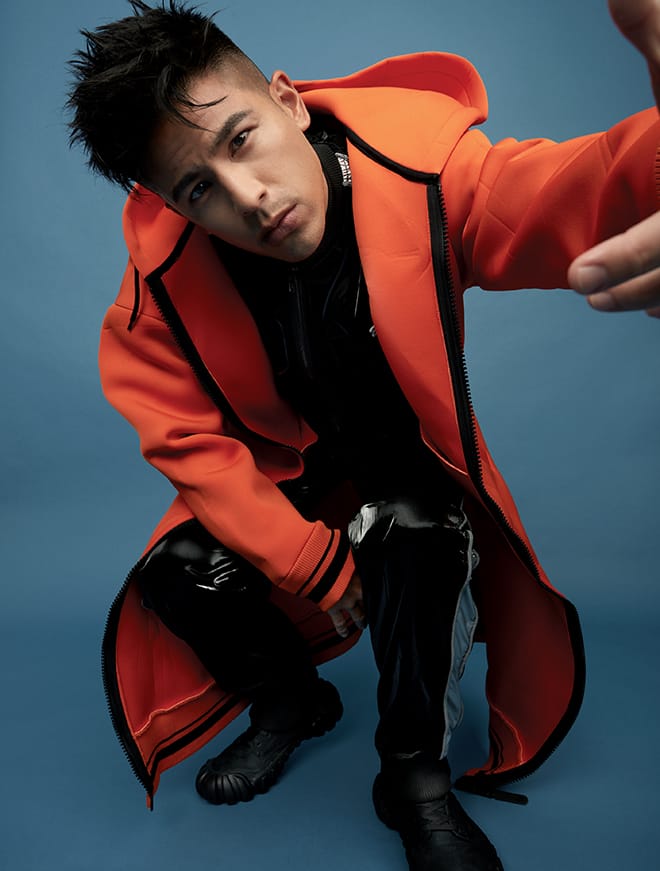
Dealing with stereotypes and public scrutiny is also part of an artiste’s life — their work revolves around putting art for the masses to enjoy after all. Certain typecasts can be a tad overboard but Wan has not experienced anything too extreme, even with the issue of the “buff guy” typecast.
“I admit it (beefcake nickname) has typecasted me and that’s one of the reasons I slimmed down. But for me, I don’t allow myself to get typecasted into that because I feel I have much more to offer with my ability to do other things than to just be the big buff guy.”
“It becomes a problem if an actor wants to break out from the typecast. It takes a lot of time, patience and hard work to break out for what you are known as. At the same time, it could work out for some. No matter what, put in 110% effort because you never know if that’s the role that propels you into the next big thing.”
“I would like to try different things — anything that a character requires me to do. I’ve bulked up to 90kg+ before and will slim down to a stick figure if I have to.”
When asked about misconceptions he faced, Wan pointed out that artistes are ultimately humans. “People forget we are humans too and not just superstars. I don’t mind being stopped on the streets for a photo and I would gladly do so. I might not remember it, but the memories will last them a lifetime.”
“I’ve always wanted to be in acting to give back to the community by bringing happiness. If I had a superstar platform, I would use it to spread joy. Unfortunately, it’s one of the things a lot of actors lose in time.”
Social responsibility is another topic touched on by Wan, given the rampant days of social media we live in at present. All it takes is a slip of the tongue to paint you the devil, which is why the thespian cautions the use of speech. “Everyone has their opinion and I feel it absolutely matters to have it but you have to be smart about the things you say and to use it in the right context,” ponders Wan.
“You have to make your point in the correct manner and put your heart in whatever you say. You never know what anyone is going through; don’t offend others.” A sentiment echoed by Richie Koh as well. As opinions get put across in the digital world, whether it is a speech, tweet or a caption on Instagram, feelings and context get lost.
This is where his caution becomes paramount because we and the world have seen comments taken out of context and invariably causing offence and hurt to some.
Sensitivity is key and it comes from being constantly aware of the feelings of others and not only yourself. If you think about it, it is considered an art as well, the art of empathy.
Dial it 110%
The struggles of a young artiste and one who is deliberating entering the arts industry are one that Wan finds familiar. Many times we have seen aspiring artistes who are unwilling to take the first step for fear of being ridiculed or not having the self-belief and confidence to present their talents to the world. Wan’s advice is to go with your gut feeling and where your heart truly lies.
“Whatever that is meant for us, is meant to happen. If it makes you happy and if you decide on that spur of the moment that it is correct for you, go 110%.
Another advice of Wan is to start young where possible. “Take the chance and do it when you’re young,” he highlights, “don’t wait till you’re too old and wish you could go back and take those opportunities of what you thought was your passion at that time. You never know what you’ll fall into because it could propel you sky-high.”
We have seen young creatives entering the industry, fearlessly pushing the boundaries of art to explore and test their mettle. The debate of support for the arts rages on. Some view it as necessary, while others have differing opinions.
Being in the arts community, Wan feels chances and opportunities should be grabbed, whether or not safety nets are in place for artistes.
“The narrative is the same, take those chances. If you feel really passionate about being an artiste and you strive towards it, there’s nothing that can stop you. I’ve been in difficult situations but it doesn’t matter because this is what I love. If you keep striving and pushing with the ability that comes with hard work, you’ll be able to do it.”
A lack of money and being considered an outsider were some of the challenges faced by Wan during his budding acting career. Having left New York for Hong Kong, he could neither read nor speak the language which was a big stumbling block at first.
“I was a fan favourite of the audience in Hong Kong, but not so much the fan favourite of the TV company because I came from a foreign country. It was very hard for them to use me as much as they could as I didn’t speak the language. I had much criticism for my Chinese,” Wan shares of his early struggles.
That never stopped Wan as he held on to his passion and love for acting, and through hard work, determination and perseverance, he broke through and made a name for himself. That does not mean he is resting on his laurels though as he views acting as a lifelong journey.
“I don’t think an actor can really make his mark because you just keep creating and coming up with new ideas. You’ll have milestones but I don’t think there’s one thing that defines you forever. It’s the passion you love so much for the art itself and to me, there is no mark. You can continue acting for as long as you want.”
This is why Wan is not taking anything for granted and neither is he letting the perks of the job get to his head — namely fame and fortune. Instead, he recognises the power of influence he has been blessed with. “Money and fame is an absolute plus but not something I build my career on. I’m into acting because it’s my passion; I love it. More importantly, it’s a platform to bring happiness while bringing up certain topics and messages across to an audience. You have that ability when you are famous and people will listen to you.”
That explains the positivity Wan perpetuates with a smile on his face. He reckons his mindset was meant to always be happy in spite of setbacks. An injury sustained in 2017 resulted in him pulling out from big films and projects he was preparing for but he looked at it with a positive attitude.
“Maybe those lost opportunities could’ve been a breakthrough, but if it’s your time and meant to be, it will come.”
“I believe in always staying in the positive mindset, being happy, shedding light and knowledge to others and being bright to the people around you even if you don’t know them. I think that is very important.”
Alan Wan is wearing an Onitsuka Tiger Polyester coat, cotton & polyester jacket, cotton && polyester pants, DENTIGRE leather boots.
—
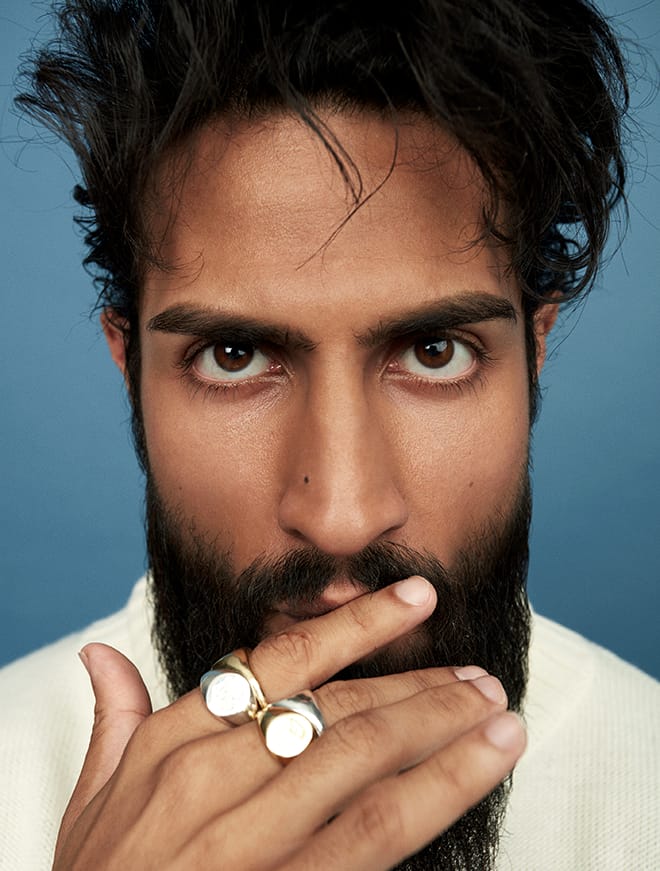
Vinny Sharp — The Well-Bearded Man
Los Angeles could have been home for Vinesh Nagrani since April had COVID-19 not happened. It was meant to be a period of growth for his career and an opportunity to set his on-screen persona, Vinny Sharp on a different trajectory as he dabbles in what he loves — unscripted documentaries.
It was supposed to be the start of him realising and maximising his potential, but it was not meant to be.
Life presented a discomfort so great it forced countries into lockdowns; every single plan made by mankind got thrown Out of the window. The future is clouded by uncertainty that evolves with every passing moment, but every cloud has a silver lining and it was these dark moments that sharp experienced a vulnerability so profound we were humbled by it.
“It’s not about where you are but who you’re with,” shares Vinesh Nagrani, “nothing has been more apparent to me in my life than now, because of what’s happening in my life now.”
This story of Vinny Sharp begins with the end of our conversation. We dug deep into the brilliance of the man and uncovered wisdom that was meant to be shared, but he pointed out at one juncture during the interview, “there are other important variables in life; things happen and you have to re-calibrate.”
Sharp’s rise to fame can be attributed to his verbosity and an unlikely stage where he puts forth his art. With Singapore’s skyline and a bare rooftop as a background, it is there where his ideas, thoughts and imaginations manifest into reality.
Through film, Sharp conveys nuances, subtleties and philosophies and his perceptions of life via stories, dialogue and writings, so to say the least.
“I do not struggle with creativity (as a one-man show) because there is too much to do — too many permutations, arrangements and combinations. I rather say I have an issue with the paradox of choice rather than having not enough choices. I’ve always lent my consciousness to daydreaming, so the department of creativity is never really an issue,” says the self-professed professional daydreamer.
And his perceptions are very much different from others.
Hustle, Hustle, Hustle
Vinny Sharp was started for a few reasons, one being his own consciousness that a regular nine-to-five was not going to do him any good. “Given my track record growing up, I knew I wasn’t going to be answerable to someone who I probably won’t be able to respect enough to work for,” says the Economics graduate from the University of Manchester.
The other reason stemmed from desperation — a man up against the walls with a restlessness to live life to his own terms. His plea to the universe was answered, one thing led to the other and eventually it all conspired together to allow him to live life on his own accord.
Even though he is blessed with this prerogative, Sharp recognises the need to keep grinding and in his choice of words — to hustle. Questions have been raised about the support systems in place for the arts industry, especially during the trying moments we are living in right now but has that not always been the case for the arts where a majority of funding went to commercial works?
“The fact of the matter is that art exists to express pain and triumph, and not just triumph alone. I personally believe that as long as someone’s got a paper, pen and voice, he doesn’t need anyone to create a more comfortable environment so that his artistry can flourish,” says Sharp as he was quick to admit his perception is not orthodox.
Yet, his opinion does not discount the fact that whatever one wishes to obtain in this world should be given and not earned.
“I have no sympathy for people who complain they don’t receive enough support. I believe if you are going through a tough time, you hustle,” adds Sharp, “that’s the point of an artist. You hold a mirror up against conventional people who don’t believe that art is necessary. Fight to prove why it is — that is the point of an artist.”
The definition of an artist is different in the books of this filmmaker. A warrior is how he views an artist to be, where it is a never-ending battle to come up with the pragmatism and logistics that creates a sustainable lifestyle — one that reminds people of how painful and beautiful life is.
Of course, the most critical component to one’s sustainability is his revenue stream. The disproportions of salary measured against talent and ability do not apply to an artist alone but to all vocations across all walks of life.
“Life isn’t fair. Live with it. Feel the textures of unfairness and grow from it. We are here because of natural selection so if it’s not enough, hustle. Do whatever you can so that you can do what you want to do.”
If hard work and resourcefulness are the ingredients Sharp advocates, then comfort is what he cautions of. Life is not meant to be a bed of roses, neither is it a comfortable ride. Yet many fail to understand and instead yearn for more comfort.
“Nothing comes out of comfort and it is the most poisonous thing especially for an artist. More pain and discomfort I say because greater things will come out from it. I have faith in the human species — that we have the ability, mind, intuition and imagination to create beautiful solutions out of problems.”
Know Your Self-Worth
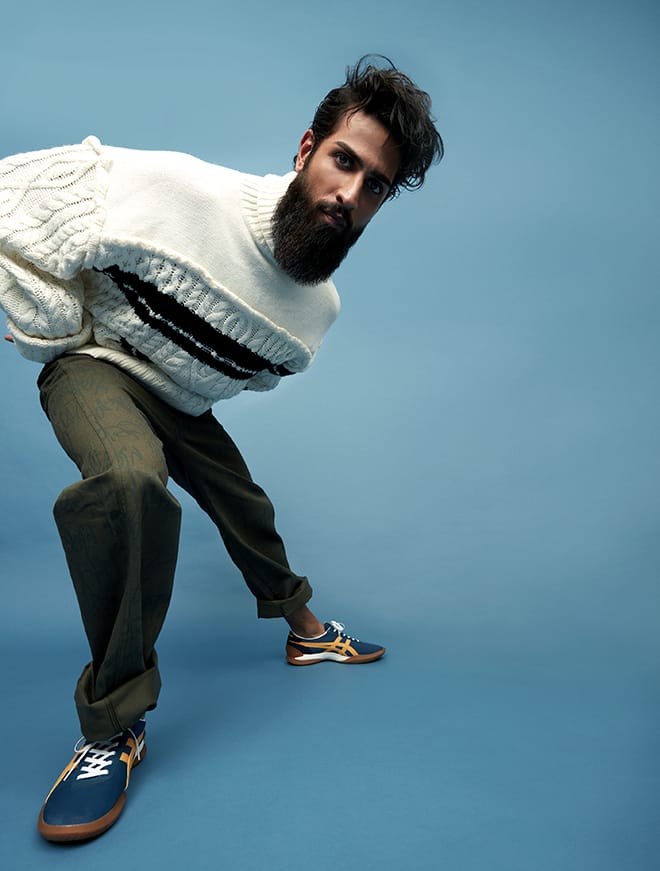
The recent debacle of an artist’s work being essential versus non-essential has sparked controversy as we go through a period of crisis. Rather than freaking out, Sharp was quick to shoot down the sentiments of the thousands.
“Of course, certain aspects are more important in a crisis and it’s understandable. You need to feed people, create a hygienic space and provide medical support to push society forward to eventually get to a normal state where everything is necessary and as important. There is no such thing as something being more essential than another.”
“As an artist, you should know your worth. You’ve been gifted with a vision and a talent to educate others. You should not sit on some high horse and expect people to validate your existence; you should validate yourself by bringing meaning to your life.”
Whether one admits it freely or not, art exists everywhere among us. Art exists in the architecture we live in, to gastronomy and mixology and even the simple gait of our walk.
We are artists in our own little ways and it is within human nature to be reliant on art. We enjoy being aroused by emotion, to be provoked. Crucially, art cannot be without meaning as the point of art itself is to express a narrative, perspective and even neglected emotions.
Defining the value of an artist’s work takes on different meanings. After careful deliberation, the framework of Maslow’s hierarchy of needs was brought into the conversation.
“At the very top sits the calling of life — self-actualisation,” Sharps points out, “but that does not mean those are more important than the foundational necessities and vice versa. Every segment on the pyramid needs each other.”
“At the end of the day, every element in this universe is a necessity,” Sharp explains. “I cannot place more value on a specific vocation than another. We are all literally part of one entity and we’re all broken up and delegated with different responsibilities.”
Be In the Now
Sharp shared with us a mantra he lives by — “taking it one day at a time and living in the present” — as he reveals plans to move to Los Angeles that have been put on hold by the pandemic.
“I don’t know when my last day (on earth) is going to be. Whenever it is, I think I’d still operate in the same fashion which is to live the present to the fullest and a day at a time.”
Coupled with the enforced period of lockdown, Sharp has put his spare time to good use, though for the man himself it is second nature to do so. “I’m reading and writing a lot to educate myself; that is what I enjoy doing. I enjoy every single day to the fullest and learn as much as I possibly can to refine the output I create and find ways to create beautiful things, evoke emotions, provoke thoughts and make people feelbeautiful.”
“Life hits you like a train in unexpected fashions. A lot has happened in the past couple of months and life has changed so much in the past year,” says Sharp in a slightly hoarse voice.
During this exchange, the pauses between each sentence grew longer. We understand when one pauses for a thought but this was different as there was a different vibe emanating from Sharp. One could feel a mixture of emotions as he went on and the shift in atmosphere was perceptible.
“What matters more is the people you’re with and that has never been more apparent to me than right now as a result of what has happened in the past couple of months.”
“I’m taking it a day at a time and am listening to the compass that I’ve been listening to my entire life, that I have no regrets with and that is to follow the compass of my heart. Things feel right at the moment and I will continue following that compass.”
End notes of the writer: Los Angeles felt like a chapter in Vinny Sharp’s life that represents a paradox — closure for what has happened and a period of new adventures with important people in his life. I stand corrected on this matter but for now, Sharp can be found at his neighbourhood sensei nursing his back.
Vinny Sharp is wearing an Onitsuka Tiger Wool sweater, cotton pants, OHBORI EX leather and rubber sneakers; Artiste’s own Metal rings.
—
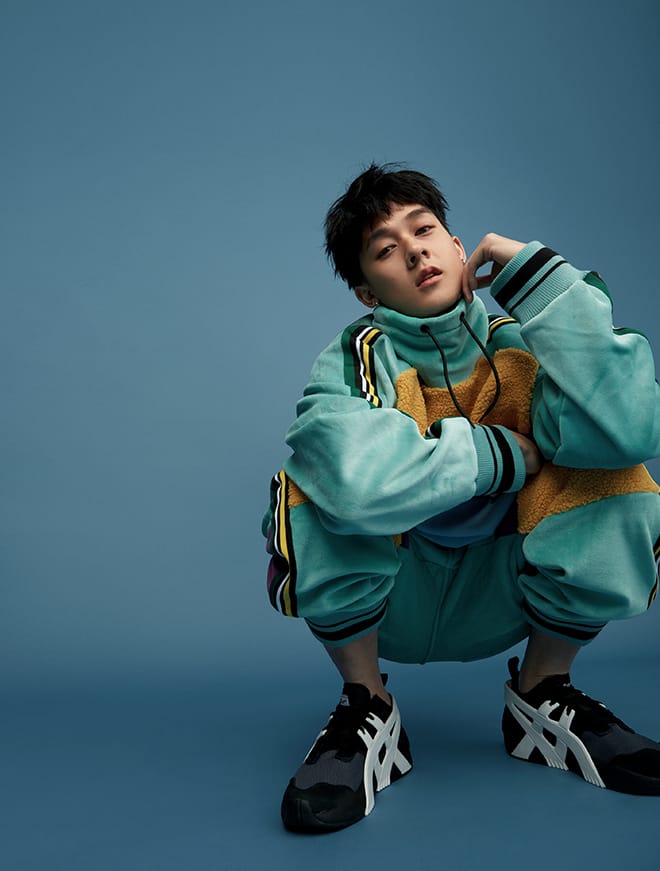
Richie Koh — Life Of an Actor
Fresh-faced is perhaps how one would describe Richie Koh, who began his acting career in 2017. He was first discovered in 2013 after emerging as a runner-up on channel u’s campus talent hunt, Hey Gorgeous. National service in between meant his journey as an actor had to be put on hold but that did not stop Koh from pursuing his dream.
From his younger days, Koh grew up watching Chinese dramas and recalls watching the after party of Mediacorp’s star awards and wanting to be a part of it. Time went by and now, he can proudly say he is amongst them.
Before becoming an actor, he received mixed responses about joining the arts industry. The conventional leaning crowd told him to play it safe, to take the “normal” career route while others felt it would be an interesting path to explore. Koh went with his feelings and he has since scored three projects with overseas production houses amongst others he has done in singapore.
“At the end of the day, I chose it (to be an actor) because it is what I like and enjoy doing.”
Still, the journey was not easy for the fledgeling actor as there were moments he thought he had made a mistake taking the path of an artiste.
“There are times when you’re doing so much but yet you feel underappreciated. A lot of work is done behind the scenes which people don’t see most of the time,” Koh shares, “this applies to other jobs as well and not just acting.”
“It’s all in your mind. You need to readjust your perspective and not let those issues affect you. It’s from this where you get the energy to push forward with your passion.”
The big break for Richie Koh came when he decided to sign with China’s LongAllStar Entertainment Group to develop his career overseas. Having done three projects so far, the first was the most memorable and left the deepest impression on Koh.
He cited that the experience played a crucial role in the growth of his career.
“We were whisked away onto location and stayed there for a month straight. The entire project crew lived together and we worked on the production every day. It created a momentum to learn from everyone, from the directors to the support crew. Everything was on a different level compared to Singapore since they had more resources to work with.”
“I saw first-hand how much effort and hard work they put into their craft. There was a separate incident where a director fired a crew member on the spot because he wasn’t performing up to expectations.”
“This made me realise that there are many people out there who are hungry for one’s job regardless of industry. If you don’t perform, someone is ready to take over your position.”
Thankfully the media industry in Singapore is a little more forgiving but Koh is not taking anything for granted. His hunger to improve and grow has pushed him to strive for greater things but nothing was done to meet the expectations of others thrown on him.
“Expectations can stress yourself out. There’s no point meeting people’s expectations because it will keep increasing. Instead, I value the opinions and perspectives of the people within my circle (family, friends and manager). We understand each other and I believe they will help me realise my potential.”
A lifelong journey in acting is what Richie Koh wishes to accomplish as an actor. He expresses his hopes to form deeper connections with his audience and to portray characters of various generations. “I get cast for young characters now because of my age but I hope to eventually play a grandfather as I progress,” Koh says with a chuckle.
Under the Public Eye
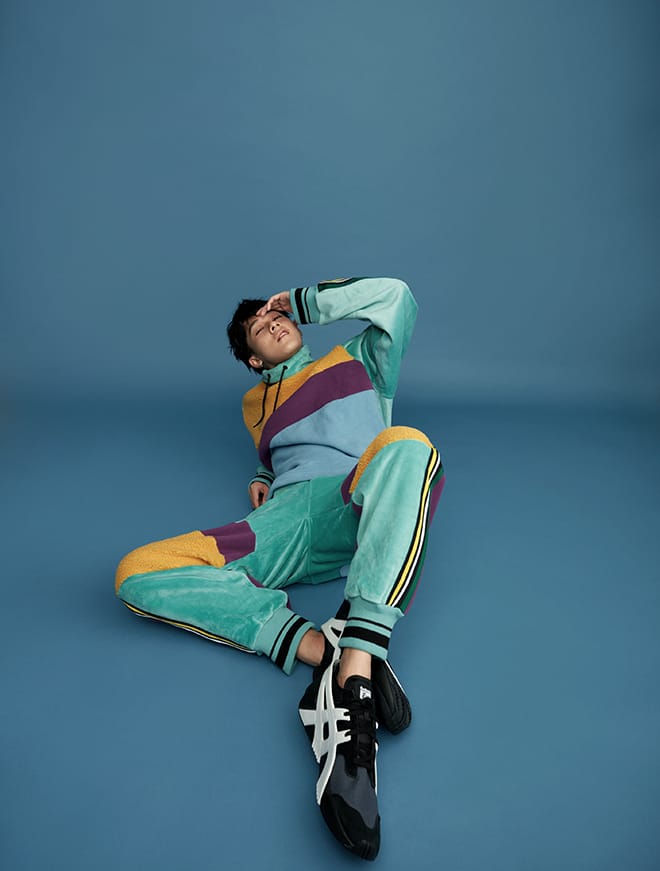
Dealing with the public has never been an issue for Richie Koh as he has learnt to ignore their opinions and criticism which have the power to damage his confidence to an extent that it could even dehumanise him.
However, Richie filters them from his consciousness. “Maybe I’m not that famous too,” laughs Koh, “but I don’t bother and choose not to care about those comments and neither do I go on social media too much these days.”
“We just need to understand that everyone is different and accept their flaws. They can be good at one thing and bad at another, which is completely fair.”
Still, Koh took this opportunity to highlight a couple of misconceptions about his job and the topic of salary was one he addressed. “We’re not paid like Hollywood actors,” exclaims Koh, “it’s quite difficult here in Singapore and we don’t get as much as what people think we do.”
“For me, I don’t talk much; I prefer to listen and observe others but that can be misunderstood by someone who doesn’t know me,” shares Koh. Ignorant and arrogant are some tags cast on the young actor who hides a maturity behind his youthful demeanour.
“I’m afraid to say the wrong things; certain things can be sensitive especially when it comes to other’s private lives, you never know a person’s background or what he’s going through and it could cause hurt. That is why I prefer to listen and observe.”
The popularity of social media throws a spanner in the works. A huge portion of public scrutiny and cancel culture would be non-existent had it not been for social media, but it is here to stay and we have to deal with it accordingly.
“People should be free to express themselves but they need to use it (social media) responsibly. It could be a rant to let off some steam but they need to realise they have siblings, relatives and friends looking at their content. And this responsibility comes as we age. We need to grow, be mature and set an example for others.”
What Does Art Mean?
Imagination and creativity, and the ability to create something out of nothing are how the thespian defines art. It conveys messages and becomes thrilling when the audience can decode them.
Art is everywhere and it is a narrative that has been extensively covered alongside the other featured artistes. However, every individual contributes his unique take on the topic — regardless of their age, an art form, culture or upbringing.
“Everything we see is influenced by art. If not for it, a lot of things wouldn’t be around and we won’t have what we have today, which some of them we take for granted. Art is beautiful.”
“I wish we’re given the freedom to portray our expressions and creativity. There are things we do in our daily lives but we aren’t allowed to portray them.”
“I’m convinced that the arts have a big future, especially in this period we are living in. Just look at the movies; these are little things that people look forward to but when they are faced with difficult times, they say things like there is no future in the arts.”
“When we were perceived as non-essential, I didn’t feel hurt. I felt insulted. Even if it’s not about dramas or movies, there are many other people (musicians, producers, composers, scriptwriters) in the arts. These people work very hard and sometimes even harder than some of us (actors). I don’t think those people were in a position to judge if a job is essential or not. Maybe they were focused on one group of people but they should have considered everyone’s feelings in the arts industry.”
Through Richie Koh’s passionate defence alongside his peers on the importance of the arts, it can be seen that there no longer is any relevance in the discussion of an artists’ essentiality.
A deeper appreciation for their crafts and its application throughout the fabric of society is a more embedded conversation to be had moving forward.
—
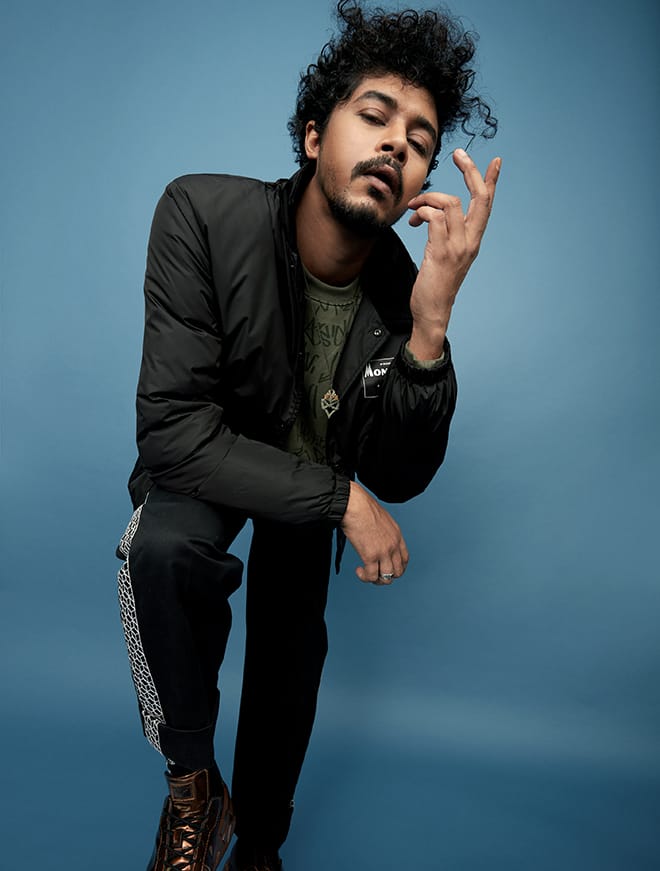
James Kumar — Affirmation and Adversity
“You choose, a mind that is a fortress or a mind that is a prison” — reads a tweet by poeticsuicides, the philosophical-dishing alter ego of James Kumar.
For those unfamiliar, James is a household name on Vasantham, singapore’s network focused on the local indian community. Apart from the odd “good morning” or “what’s up guys?” tweets, poeticsuicides is a trove of wisdom formed by a man’s experience of ups and downs.
His twitter account is very much alive and it is within that digital sphere where we had a first peek into the mind of james.
Speaking to the man himself is a wholly different experience. As he sheds light on his experiences, it connected the dots between his opinions and rationales, which gave us a deeper understanding of not only an actor but a man who lives his life both in and out of the camera’s lenses.
Life has a funny way of letting things fall in place for those with the courage to take the first step into the unknown and it was through helping a friend with a favour that led James into acting.
“I didn’t choose to become an actor, it chose me,” remarks James. “I am what you consider an accidental actor. A director friend of mine asked me if I would consider doing this role for him for a drama episode and I agreed to do him a favour.
There was some talk in town after and it led me to my first season-long opportunity in the drama Vettai 2.0 which turned out to be my big break.”
The commitment and hard work James put into the drama was rewarded with the Best Newcomer award in Vasantham’s Pradhana Vizha Awards, which cemented his belief that this could be it.
“It (the award) gave me the affirmation and confirmation that this should be the path I should explore and here I am, eight years later.”
In spite of that, James was quick to point out the difficulties an actor faces — not having a regular paycheck being one of the most challenging. “We get paid for the work we do and we sometimes take on ad hoc projects to bolster our income,” shares James.
“There comes a point when you have to consider putting a halt to your passion for acting to take on a full-time job and act part-time. In that sense, I believe we lost a lot of talented artistes in our previous generation because not much attention has been given to that batch of people who were really into the arts.”
As if the stress of job security was not enough, there is society’s sneering gaze to handle. Being in the public eye results in both admiration and criticism, though the latter is more commonly experienced given its unorthodox choice and a career for a Singaporean.James shares with us a mantra that he lives by — let the audience boo and hiss at you, at least they are having fun. “I don’t let a lot of things get to me, as long as they are having fun or not pulling the plug on themselves,” laughs James.
“Once you put your art out, it does not belong to you anymore. It is up to the audience how they want to perceive it. You just have to take negative and positive remarks with a pinch of salt and move on.”
“Some people think that we actors are all about fame, fortune and play but it is not true. Acting is as real a job as any others,” James says as he points out a misconception about the work which requires him to pour emotions while taking on different egos in front of the camera.
“It’s a job that involves putting out a show that has a meaningful message behind it for the community and society which is critical towards nation-building. It’s the same for a chef who enjoys food and cooking, it is his way of giving back to the community.”
Passion Runs Deep
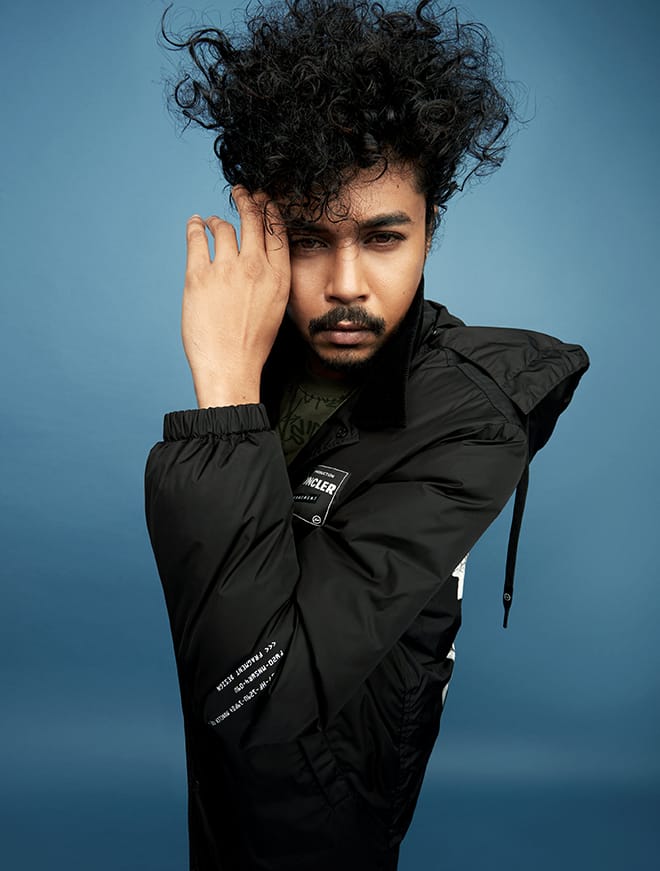
Despite the challenges James has to face till this very day, his passion for not only acting but creating was also palpable as our conversation continued.
For an artiste whose livelihood is challenged not only by society but by circumstances, it is his love for his art form that gets him on the studio set each day. James, who plays the role of Dr Arjun Bhaskar in the mega 823-episode drama Tanglin, fondly recalls being part of the series.
“I was having a blast when I was on set, it felt like a huge theatre play. Those three years of production were a joy to be a part of and it never felt like work,” says James who put the production scale into context for us.
A set was built, there were six directors, the main writer was supported by numerous others, three teams were shooting weekly and the entire crew was huge. “It was not just about the actors, I got to meet all of the crew who represented all walks of life.”
Acting is not only his passion as he professes his love for music. “I was thesinger and writer of a band called Peepshow and our last show was a performance for the Youth Olympic Games in 2010. After we disbanded, I still wanted to make music, so I learnt how to do it — albeit slowly,” quips James.
“I felt brave enough in 2019 to put out my music but I’m not looking to garner anything out of it; it’s a means to express myself. I’m still a work in progress and I just want to put my work out for people to enjoy.”
Yuttham, James’s next single in the works is one that took him out of his comfort zone. Written almost entirely in Tamil, it is a first for the actor who later laughs about having to rap portions of the song in his mother tongue.
“I guess it’s fast-speaking more than rap because I don’t want to offend those who do it well.”
Mental Fortitude
A few hashtags from Yuttham such as #suicide, #antiracist and #pandemic point to the narrative of the song — an anthem to rally people to face adversity in its face.
“Yuttham means the battle. It is my way of telling people to not let these things get them down. There is so much happening around us and some people give up at times. It is as simple as having depression which I admit I still deal with.”
The tweet, “You choose, a mind that is a fortress or a mind that is a prison” was made to address the pertinence of mental illness in our society today and it was confirmed by James.
“I’m not going to lie and say it’s easy, but it’s about taking baby steps to change your mindset and the way you feel about yourself and others around you,” highlights James, “the most harmful way a depressed person can feel about themselves is that they feel pitied upon, but they need to know that the concern they’re getting from others is out of love. And love does not exist through pity.”
In the difficult times we live in, spreading positivity is paramount. For some, it can be as simple as a “you can do it” message. James takes a different approach however with his poetry as it gets people pondering.
“I wrote this — red or blue, even if it’s true. An opinion from you disagreed by a few. I try not to be too opinionated and neither do I put out a statement that is black and white. But what I do offer is an alternative opinion.”
Indeed it is through his method that resonates strongly with us. Many times, we can get so self-absorbed that we only see one side of things and it is through thought-provoking statements that we open our eyes to see issues we were negligent of — it ignites conversations, both within ourselves and the community, in hopes that we can emerge stronger.
James Kumar is wearing an Onitsuka Tiger Cotton T-shirt; 7 Moncler Fragment Nylon jacket, nylon-blend pants.
—
Photography Joel Low
Videography & Editing Jaya Khidir
Art Direction Izwan Abdullah
Styling Wilson Lim
Styling Assistant Manfred Lu
Photography Assistant Alfie Pan
Hair Eric Tan and Lenny Fu using Keune Haircosmetics
Grooming Eric Tan and Lenny Fu using Shu Uemura and Kenneth Lee using Clé de Peau (for Richie)
This story is slated to appear in the August 2020 issue of Men’s Folio Singapore.
The post Walking the Big Talk — Vinny Sharp, James Kumar, Alan Wan and Richie Koh In Our August ’20 Heroes Issue appeared first on Men's Folio.